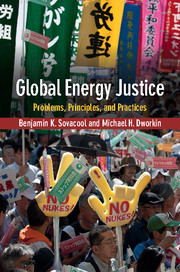Book contents
- Frontmatter
- Epigraph
- Dedication
- Contents
- Analytical table of contents
- List of figures
- List of tables
- Acknowledgements
- List of abbreviations
- 1 Introduction
- 2 The global energy system
- 3 Virtue and energy efficiency
- 4 Utility and energy externalities
- 5 Energy and human rights
- 6 Energy and due process
- 7 Energy poverty, access, and welfare
- 8 Energy subsidies and freedom
- 9 Energy resources and future generations
- 10 Fairness, responsibility, and climate change
- 11 The imperative of making just energy decisions
- Index
- References
9 - Energy resources and future generations
Published online by Cambridge University Press: 05 October 2014
- Frontmatter
- Epigraph
- Dedication
- Contents
- Analytical table of contents
- List of figures
- List of tables
- Acknowledgements
- List of abbreviations
- 1 Introduction
- 2 The global energy system
- 3 Virtue and energy efficiency
- 4 Utility and energy externalities
- 5 Energy and human rights
- 6 Energy and due process
- 7 Energy poverty, access, and welfare
- 8 Energy subsidies and freedom
- 9 Energy resources and future generations
- 10 Fairness, responsibility, and climate change
- 11 The imperative of making just energy decisions
- Index
- References
Summary
In 2001, President Fradique Menezes of the Democratic Republic of São Tomé e Príncipe was in trouble. São Tomé is an archipelago of roughly 1,000 square kilometers in the Gulf of Guinea. With a population of 160,000, it is West Africa’s smallest democracy, Africa’s second smallest country after the Seychelles, and the third smallest economy in the world. To put its size in perspective, the country is about five times the area of Washington, DC.
During this time, President Menezes’ country was almost entirely dependent on foreign aid, notorious for somewhat humorous cases of petty corruption and, due to lack of money, government neglect and a highly undiversified economy. For instance, throughout the 1990s, foreign aid represented 97 percent of government revenue, making it the largest recipient of donor aid per capita in the world. São Tomé also had the highest debt to GDP ratio of any country in the world. São Tomé had to import everything – every light bulb, car battery, computer, sock, fork, plate, curtain, shoe, and so on – from vast distances, since neighboring countries also produced little and imported almost everything from Europe. The national economy was dependent on cocoa production as the main commercial crop which produced less than $4 million per year, and income from tourism was marginal. Due to its sheer lack of resources and high rates of debt, the São Tomé economy featured numerous “creative” state-sponsored enterprises such as offering black market passports, licensing flags of convenience for international shipping companies, producing commemorative postal stamps featuring Marilyn Monroe and the Beatles, and even government-endorsed X-rated telephone calling centers.
- Type
- Chapter
- Information
- Global Energy JusticeProblems, Principles, and Practices, pp. 288 - 318Publisher: Cambridge University PressPrint publication year: 2014



